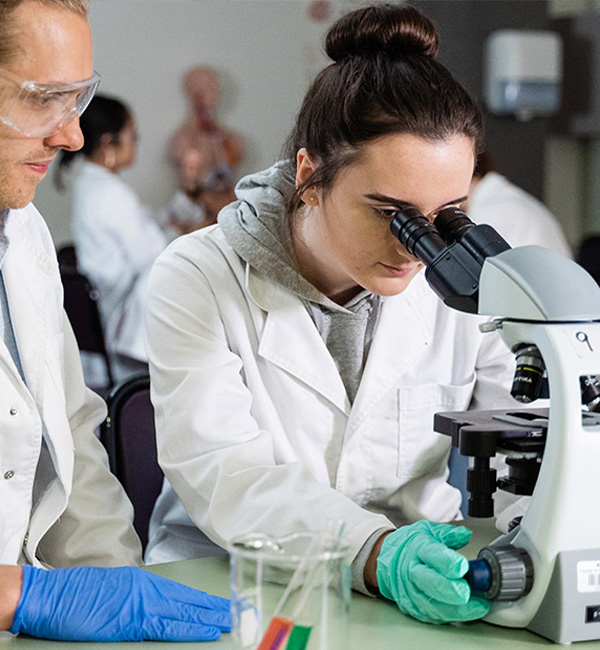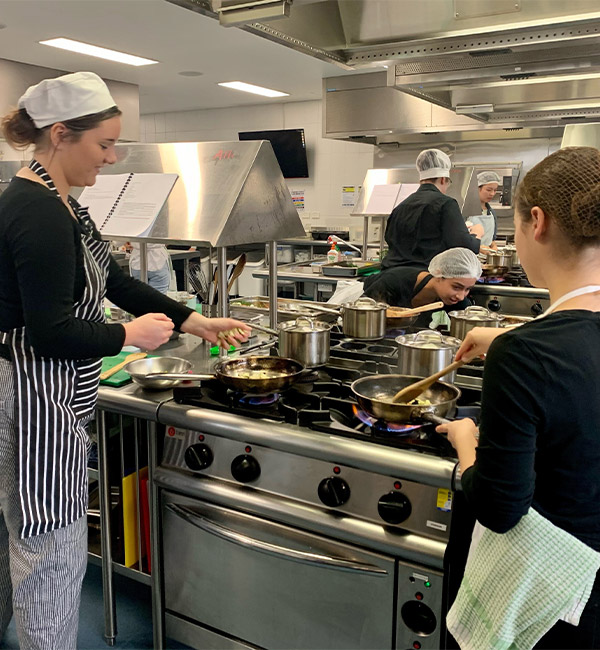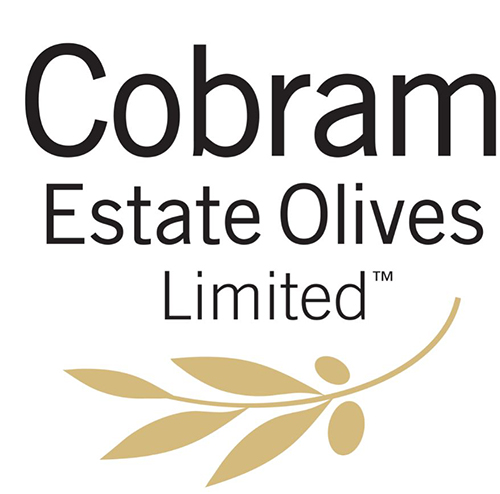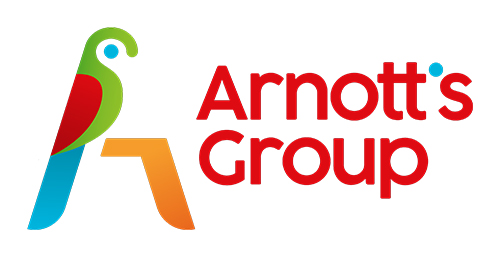Bachelor of Nutrition Science
Course information for - 2024 entry
Offered at 3 locations
- Duration
- 3 years full-time or equivalent part-time
- UAC code
- 107018
- ATAR
- 58.50 for Blacktown
- Fees (first year)*
$9866 CSP
- Start dates
-
Semester 1 intake: Beginning February 2025Applications open August 2024Midyear (Semester 2) intake: Not available
Please note the Public Health major is not offered in 2024
Overview
As a nutritionist you will create opportunities for people to learn about food and nutrition, design food products to support a healthy diet, influence food systems to foster sustainability, and advocate for a safe and equitable food supply across the globe. You will understand the science behind food and nutrition including human physiology and biochemistry, and food and culinary nutrition science. The focus on the role of food and nutrition in health promotion and disease prevention for individuals, communities and populations, particularly in at-risk groups, will prepare you for work in the emerging areas of the industry.
In order to practice as a Dietitian - that is to work clinically with patients with conditions ranging from eating or gastrointestinal disorders to allergies, providing nutritional advice to help them manage their conditions - nutritionists and those with a Bachelor of Nutrition need to study an accredited specialist qualification in Dietetics or Dietetic Practice which is the application of the science of food and nutrition across a range of domains to improve the health and wellbeing of individuals, communities, and populations. Such courses combine theory and practice placement across dietetic practice areas including food and nutrition counselling with individuals, food and nutrition education and capacity building with groups, public health nutrition, food production and provision to individuals, communities and populations, entrepreneurial dietetic practice and management, and research. ACU’s Master of Dietetic Practice is a 2-year full-time program in which students will undertake more than 130 days of placement.

Professional experience
Work placement units provide you with exposure to work settings where you may gain employment following graduation. You may choose to undertake work placement units offering 50 – 140 hours of work in areas across the food and nutrition industry including food industry, culinary nutrition, sports nutrition, community and public health.
Work placement
Work placements provide you with exposure to work settings where you may gain employment following graduation. You can choose to undertake your placements in areas across the food and nutrition industry.
Placement opportunities may be with sporting teams/clubs; food development and production companies; restaurant and catering groups; community health centres; local government; schools; community organisations and other not-for-profit health organisations.
Visit the faculty’s Work Integrated Learning (WIL) webpage to view opportunities in nutrition science.
Community engagement
Principles of community engagement are integrated throughout the course and are embedded in the public health community engagement unit. This unit has been purposefully designed to give you the opportunity to apply the principles and philosophies of working in the community for the common good into real-world, applied settings.
Professional recognition
Graduates of this degree will be eligible to apply for registration as a nutritionist with the Nutrition Society of Australian (NSA). This degree has been designed to meet the competencies deemed essential by the NSA for registration.
The degree meets the academic qualifications required for Professional Membership of the Australian Institute of Food Science and Technology (AIFST). Note: Professional Membership of AIFST also requires three years of relevant professional experience.

Careers
Graduates will be qualified to work in:
- food and nutrition research
- food and nutrition education
- food and nutrition communication
- food and nutrition advice
- food product design
- food science and technology
- food and nutrition policy
Course details
Course structure
To complete the Bachelor of Nutrition Science, a student must complete 240 credit points (cp).
Available Major(s)
-
Culinary Nutrition
In order to communicate food and nutrition concepts effectively, nutrition scientists must have a thorough understanding of food, from the organic chemistry of food macromolecules, to how food is transformed from its raw state to the multitude of formats available for consumers.
In the culinary nutrition major sequence you’ll learn about the origins and composition of food and how composition is affected by culinary processes.
You will undertake units in Advanced Culinary Nutrition Science and Foods for Special Diets where you will solve nutrition related problems through innovative planning, preparation, cooking and presentation of food. You’ll look at the design of eating environments and eating occasions that have high sensory appeal, and engage and influence audiences through evidence-based communication on diets for specific needs. You will have the opportunity to complete work placements in the culinary science industry and undertake an overseas food and culture study tour.
Food Science
The food science major sequence will provide you with a thorough understanding of food, from the organic chemistry of food macromolecules, to how food is transformed from its raw state to the multitude of formats available for consumers. In the sequence you will also gain authentic learning experience through two industry placements, one of 50 hours, and the second of 90 hours. Through these placements you will have the opportunity to develop both discipline and professional skills critical for graduate employment in the industry. You will have a choice of electives ranging from culinary nutrition and business units to a food and culture study tour.
Available Minor(s)
-
Exercise Science
A healthy diet and regular exercise are key to a healthy life. Learn more about the science of exercise and develop a deeper understanding of the role exercise and nutrition play in health.
In the exercise science minor sequence you will explore the multifaceted, cross-disciplinary sectors in which exercise science professionals and coaches work, from the health sector to high performance sport. You will be introduced to anatomical terminology, and structural neuromusculoskeletal anatomy – the foundations for understanding implications for health.
Further, you will gain an understanding of the human body's response and adaptation to exercise and exercise training and apply the science of exercise to achieve the best outcomes for health, fitness and sports performance.
A choice of an elective will enable you to further focus aspects of exercise and nutrition.
Sports Nutrition
In the sports nutrition minor you will examine human physiology from the exercise science viewpoint addressing the metabolic foundations of exercise. You will also study the regulation and responses of the physiological systems to various exercise stressors and undertake a unit on nutrition for sports performance addressing both the scientific and applied aspects of the topic.
International Development
The international development minor sequence will introduce you to the key questions, concerns and debates shaping the multi-disciplinary field of international development and how it affects the lives of the world’s most marginalised and vulnerable. You will gain foundation knowledge of the principles, concepts and procedures characterising humanitarian work and aid including food security.
Course map
Graduate statement
AQF framework
Additional course information
Classes
Class size: Your class size will depend on the unit you are studying and if that unit is taught across different degrees. Most of the time units that are core to your degree will have smaller class sizes. The tutorial, practical and workshop class sizes are normally capped to 20 – 30 depending on the activity. In instances where learning activities need to be monitored more closely, a teaching assistant will be present in the classroom.
Contact hours: Some units will require you to attend on-campus lectures, tutorials, practicals or workshops, for up to four-six hours per week. Other units are blended with online modules (watch, read, listen and interact) to engage in before attending on-campus classes and finally some classes are delivered fully online with both synchronous and asynchronous learning activities.
So, if you are a full-time student taking four units in a semester you will have between 16 (4 units x 4 hours/week) and 24 (4 units x 6 hours) of structured learning activities each week. Keep in mind that some units will require less and some more hours each week.
Per semester, each unit requires approximately 150 hours of work which includes scheduled classes and/or online engagement with learning activities, self-study and preparation of assessment tasks.
Sample assessments
Nutrition science sample assessment examples: Each unit has three assessments per semester.
• Assessment 1 (30 per cent): Review of literature related to key topic
•Assessment 2 (30 per cent): Laboratory/practical reports or tutorial workbooks
•Assessment 3 (40 per cent): Project report and presentation or exam
If the unit has a final exam it is counted as part of the three assessments. Assessments have different weighting percentages towards your overall mark. A single assessment cannot be worth more than 50 per cent of your assessment total. The format of assessments is different for every unit and is outlined at the beginning of each semester.
Overseas study available
The Faculty of Health Sciences has partners all over the world and continues to grow the international experience offerings in nutrition science. There are opportunities to study the Core Curriculum abroad in Rome, Beijing, New York, or Leeds.
Explore the opportunities to study overseas
Or you may like to view other short-term international study experiences (STISE) that the faculty has on offer in nutrition science.
Entry requirements
An applicant must comply with the Admission to Coursework Programs Policy.
International applicants need to meet the English Language Proficiency requirements as defined in the Admission to Coursework Programs Policy.
To be eligible for admission to the course, an applicant must have completed the following prerequisites at year 12 level, or equivalent:
| State | Prerequisites |
|---|---|
New South Wales | English Standard (Band 2) or English as an Additional Language (EAL) (Band 3) |
Victoria | Units 3 and 4 – a study score of at least 30 in English (EAL) or 25 in any other English. |
Disclaimer: The course entry requirements above are for 2024 Admission. Refer to your relevant Tertiary Admission Centre website for future years' entry requirements.
View transparency admission information
Applicants with recent secondary education
You’ll need to meet the minimum entry requirements and subject prerequisites for your chosen course.
If your school result was affected by circumstances outside of your control, such as financial hardship, illness, disability or a challenging home environment, you may qualify for an access scheme. You can apply through your TAC as part of your application process.
Applicants with vocational education and training (VET) study
You’ll need to meet the minimum entry requirements and subject prerequisites for your chosen course.
For current year 12 students
If you’re a current Year 12 applicant you can be given a selection rank separate from, and in addition to, your ATAR if you’ve completed a competency-based and graded AQF Certificate III or above.
For non-school leavers
If you’ve completed, or are completing a competency-based AQF Certificate IV or AQF diploma you will be assigned a selection rank by your local Tertiary Admission Centre (TAC). This is an entry score based on your individual qualifications and achievements.
ACU has partnerships with TAFE and many private education providers. If you have completed a qualification with one of these partners or with ACU College, you may be eligible for guaranteed entry and/or credit into a related ACU degree. Please apply through your local TAC and then submit a credit application for your previous study.
Applicants with higher education study
You’ll need to meet the minimum entry requirements and subject prerequisites for your chosen course.
If you have completed at least two units of AQF-recognised study at bachelor level or above, you’ll be assigned a selection rank based on your study level, duration and grade point average that will be applied during the admission process.
If your previous study has equipped you with knowledge, skills or experiences that align with the learning outcomes of units in your new course you may be able to apply for recognition of prior learning and you may be able to complete your course sooner.
Applicants with work and life experience
You’ll need to meet the minimum entry requirements and subject prerequisites for your chosen course.
If you have no formal education qualifications you may be eligible for a selection rank based on your work, life or service experience.
- If you’ve been in paid employment, relevant to the course you’re applying for, for a minimum of six months full-time (or equivalent), this work may be assessed for your selection rank.
- If you’re 21 years or older you can sit the Special Tertiary Admissions Test (STAT) through your local TAC.
- You can apply for an ACU bridging course. Our bridging courses allow you to transition back into studying and can give you a head start on the relevant undergraduate degree.
- If you have served in the defence force, your rank and time in service may contribute to your selection rank.
English language requirements
Applicants require an academic IELTS minimum overall score of 6.5 (with a minimum score of 6.0 in all bands), or an equivalent acceptable test score as outlined in the Admission to Coursework Programs Policy (see English Language Proficiency).
Adjustment factors
If you’re currently completing Year 12 you may be eligible for adjustment factors that can boost your rank and help you get into your desired course.
Adjustment factors may be applied to your TAC application if you study particular subjects, attend schools geographically close to our campuses or in certain regional areas, apply as an elite athlete or performer or meet certain other criteria.
Inherent requirement
There are essential components of a course or unit that demonstrate the capabilities, knowledge and skills to achieve the core learning outcomes of that course or unit. You will need to be able to meet these inherent requirements to complete your course.
Learn more about inherent requirements for your course and how they affect you
Pathways
Pathways into course for current or recent Year 12 students
If you can’t meet the ATAR requirement for your choice of course and you’re currently completing Year 12 or finished Year 12 in the two years previously, we have entry programs to get you where you want to be.
Pathways into course for applicants with previous study and/or life experience
Are you applying to ACU as a non-school leaver?
By that we mean, you’re not currently completing Year 12 and haven’t completed it in the two years previously. If the answer is yes and your selection rank isn’t enough to meet the requirements for your desired course you still have a number of options to help you achieve your study goals.
If you’re over 21, you can sit the Special Tertiary Admissions Test (STAT), or you can complete a diploma or bridging course relevant to your desired course.
Further study
Graduates are eligible to apply for admission to:
- postgraduate studies in nutrition and dietetics, and public health
- one-year honours courses, for meritorious students preparing for higher degree research
- further study in other allied health professions
The course structure of this degree has been designed to meet the entry requirements for a Master of Dietetics program as stipulated by the Dietitians Australia (DA).
Fees
Course costs
$9866 CSP
All costs are calculated using current rates and are based on a full-time study load of 40 credit points (normally 4 units) per semester.
A student’s annual fee may vary in accordance with:
- the number of units studied per semester;
- the choice of major or specialisation; and
- elective units.
The University reviews fees annually.
Payment options
You should be able to concentrate on getting good marks instead of worrying about how you’ll pay your fees. We have a number of options that can help you ease the financial burden, including government assistance, scholarships and income support.
Scholarships
You could be eligible for one of the hundreds of scholarships we award each year to help students from across the university with the cost of studying, accommodation or overseas study opportunities. Some of our scholarships are awarded on the basis of merit, but these aren’t just for the academically gifted; ACU also recognises excellence in community engagement and leadership. We also offer a range of scholarships for those who may be struggling financially or who have faced other barriers to accessing education.
How to apply
Deferment
Deferment is available for one year. Find out more about deferment: Deferment Information.
Staff Profile
Emma Stirling
Senior Lecturer (Nutrition and Dietetics) – School of Behavioural and Health Sciences
Emma Stirling is a Senior Lecturer in nutrition and dietetics at our Melbourne campus. She is also an Advanced Accredited Practising Dietitian and award-winning nutrition communicator. As Culinary Nutrition Science Lead Emma brings her extensive industry experience from the food, hospitality, media and health sectors to the curriculum design, teaching and research of this exciting new practice area. At ACU Emma is also responsible for helping drive partnerships and programs with a range of community, cultural and industry groups nationally and in the Asia Pacific region.
Bo Wang
Lecturer (Nutrition and Food Science) – School of Behavioural and Health Sciences
Dr Bo Wang is a lecturer in nutrition and food science in the School of Behavioural and Health Science. He has a BSc degree in mechanic engineering and a PhD in food processing and engineering from China Agricultural University, China.
Before he joined ACU Dr Wang worked as a Research Associate at Guelph Food Research Centre, Canada, Postdoctoral Research Fellow at Deakin University and Senior Research Scientist at Australian nutraceutical ingredient company, Nu-Mega Ingredients. His research expertise is in food processing and technology, nanobiotechnology and bioactive compounds extraction and stabilisation. Dr Wang is now using his academic and industry experience to teach nutrition science courses at ACU and enjoying research by mentoring and supervising postgraduate candidates.
Testimonial

'The nutrition science degree at ACU allowed me to develop a strong scientific foundation and encouraged me to grow my critical thinking skills. Guided by industry experts, I have found the learning content to always be topical with real-world application. As a nutritionist I want to help promote the role of food as a powerful tool in chronic disease prevention and management while also helping everyday Australians embrace a healthy lifestyle.'
Have a question?
We're available 9am–5pm AEDT,
Monday to Friday
If you’ve got a question, our AskACU team has you covered. You can search FAQs, text us, email, live chat, call – whatever works for you.







